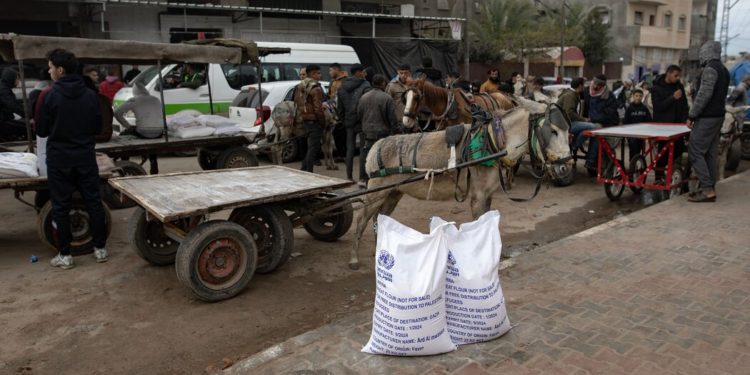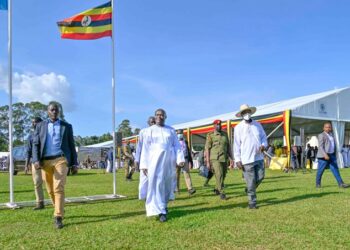By THE NEW YORK TIMES
When a senior U.S. diplomat called the Israeli military last week to request further details about Israeli allegations against a United Nations agency in Gaza, military leaders were so surprised that they ordered an internal inquiry about how the information had reached the ears of foreign officials.
The allegations were grave: 12 employees of the organization, the United Nations Relief and Works Agency, or UNRWA, were accused of joining Hamas’s Oct. 7 attack on Israel or its aftermath.
The claims reinforced Israel’s decades-old narrative about UNRWA: that it is biased against Israel and influenced by Hamas and other armed groups, charges that the agency strongly rejects.
But while most Israeli officials oppose UNRWA, some military leaders did not want to see it shuttered amid a humanitarian disaster in Gaza. In fact, it was not the military that disclosed the information to the United States but UNRWA itself.
The sequence of events began on Jan. 18, when Philippe Lazzarini, the head of UNRWA, met with a top Israeli diplomat in Tel Aviv. Mr. Lazzarini meets roughly once a month in Israel with the diplomat, Amir Weissbrod, a deputy director general at the Israeli Foreign Ministry who oversees relationships with U.N. agencies. This was meant to be a routine discussion about the delivery of food, fuel and other aid supplies to Gaza, according to a U.N. official briefed on the meeting.
Instead, Mr. Weissbrod came supplied with the shocking intelligence about UNRWA, which had been given to him by officers in the military, according to four officials familiar with the situation.
UNRWA is the largest aid agency on the ground in Gaza, providing shelter to more than half the population and coordinating the distribution of the meager aid and fuel supplies that arrive by truck every day from Egypt and Israel. If UNRWA collapses without a plan for its replacement, some Israeli officials fear they will be forced to fill the void.
Yet, a week after the allegations were published, the agency’s survival is in question.
The United Nations announced the allegations on Friday, Jan. 26, adding that nine of the 12 had been fired (two others were already dead). That prompted a cascade of donor states to suspend their funding, on the same day that the International Court of Justice called on Israel to allow in more aid, as part of its order that Israel prevent genocide in Gaza.
Then came an even bigger Israeli claim: that 10 percent of UNRWA’s 13,000 employees in Gaza were members of Hamas. More suspensions of funds followed.
Now, the agency says that its reserves could run out by the end of the month, even as aid groups warn of a looming famine. “Our humanitarian operation, on which two million people depend as a lifeline in Gaza, is collapsing,” Mr. Lazzarini said in a statement.
And Israel’s prime minister, Benjamin Netanyahu, has seized the moment to call for UNRWA’s closure.
“UNRWA’s mission has to end,” Mr. Netanyahu said in a speech on Wednesday. “It has to be replaced by some organization or organizations that will do that job.”
Part of Mr. Netanyahu’s anger at the group was rooted in the fact that the lawyers who brought the genocide case cited several UNRWA statements to support their case.
“Many of the charges, false and unfounded, that were leveled against us in The Hague were brought by UNRWA officials,” Mr. Netanyahu said.
Among the dozen employees of Mr. Lazzarini’s agency said to have been involved in the Hamas attack or its aftermath was a counselor at an UNRWA school in southern Gaza, accused of abducting a woman from Israel. An UNRWA social worker from central Gaza was accused of abducting the body of a dead Israeli soldier to Gaza. A third was said to have taken part in a raid on an Israeli village in which roughly 100 people died.
After the meeting in Israel, Mr. Lazzarini assessed the Israeli claims, flew to New York to meet with the U.N. secretary general, António Guterres, and began firing the employees, the U.N. official said. UNRWA told United States officials about the situation on Wednesday, Jan. 24, leading U.S. diplomats to ask the Israeli security services for a fuller explanation.
The American request caused consternation within Israel’s military intelligence directorate and strategy directorate, whose leaders had not known that the claims had been passed to UNRWA itself, let alone to the U.S. government. The strategy directorate was concerned that the claims had been circulated without a proper strategy.
Even officials with the Israeli Foreign Ministry were surprised by the turn of events — both when UNRWA announced the claims two days later and when donor states, including the United States, announced they were suspending funding.
When the ministry had passed Mr. Lazzarini the claims, eight days earlier, few foresaw that the disclosure would lead to such a furor so quickly, said an official briefed on the decision. Israel has made so many accusations against UNRWA over the years that no one expected this claim to be the one that stuck, the official said.
Still, the Israeli political leadership was swift to attempt to capitalize on the developments. Within a day, Israel Katz, the foreign minister, had called for UNRWA to be “replaced with agencies dedicated to genuine peace.”
Israelis take issue with UNRWA in part because they say its very existence is an obstacle to a peace deal with the Palestinians.
The agency was founded in 1949 to care for Palestinians who fled or were forced from their homes during the wars surrounding the birth of the state of Israel, in a displacement known in Arabic as the Nakba, or catastrophe.
Now, the agency aids more than five million refugees and their descendants who live across the Middle East, including a majority of the residents of Gaza.
For the refugees, the agency champions their dream of returning to their families’ former homes. For that reason, Israelis see it as a threat to Israel’s Jewish character: They fear the return of so many people to what is now Israel would pose huge demographic, security and logistical threats.
But though many military officials agree with that stance, they were wary of trying to knock out UNRWA without a clear successor, several officials said.
Within the military, generals and officers dealing with the Gaza Strip debated the wisdom of fueling the discussion about UNRWA, lest it prompt more countries to withdraw funding in the middle of a war.
But Israel’s political leadership appeared to have fewer concerns.
According to a government readout, Yoav Gallant, Israel’s defense minister, said in a speech to foreign ambassadors on Thursday that UNRWA had “lost its legitimacy to exist.”







Discussion about this post